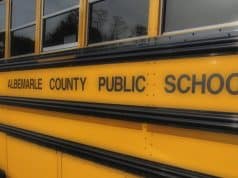
Why you should vote NO on Virginia 2010 Ballot Questions #1, #2, and #3
by Rob Schilling
On November 2, 2010 Virginians will be faced with several seemingly innocuous but fatally flawed ballot questions, primarily dealing with various facets of taxation in the Commonwealth.
At hand are three constitutional amendments, which appear on the ballot following a multi-stage approval by the Virginia General Assembly, as follows:
A constitutional amendment, as established in Section 1 of Article XII, can be proposed in either house of the Virginia General Assembly. If a proposed amendment is approved by a simple majority vote in one session of the state legislature, it is automatically referred to the next session of the state legislature that occurs after the next general election of members of the Virginia House of Delegates. If in that second session the proposed amendment is “agreed to by a majority of all the members elected to each house” it is then placed before the state’s voters. If approved by a simple majority vote, it becomes part of the state’s constitution.
Question 1 reads:
Shall Section 6 of Article X of the Constitution of Virginia be amended to authorize legislation that will permit localities to establish their own income or financial worth limitations for purposes of granting property tax relief for homeowners not less than 65 years of age or permanently and totally disabled?
Question 2 reads:
Shall the Constitution be amended to require the General Assembly to provide a real property tax exemption for the principal residence of a veteran, or his or her surviving spouse, if the veteran has a 100 percent service-connected, permanent, and total disability?
Questions 1 and 2 deal with real estate taxation. Helping veterans, disabled, and elderly people is a noble goal, as is tax reduction; the means by which the assistance will be granted, however, is insidious.
America’s founders recognized inherent peril in progressive taxation: a citizen exempt from paying taxes that his neighbor must pay, has no incentive in keeping the tax low because he, himself, does not pay the tax.
Alexander Hamilton warned against multi-tiered real estate taxation schemes in Federalist 35:
“No tax can be laid on land which will not affect the proprietor of millions of acres as well as the proprietor of a single acre. Every land-holder will therefore have a common interest to keep the taxes on land as low as possible; and common interest may always be reckoned upon as the surest bond of sympathy.”
The disastrous results of nearly a century of progressive income taxation can be seen in present day America where 47% of U.S. households paid no federal income tax in 2009. Those paying no tax actually have a vested interest in seeing rates raised for federal income-taxpayers, in order to maintain their own tax-free status.
Virginians would be unwise to allow their system of property taxation to emulate the federal model of progressive income taxation with its designated “winners and losers” and special “protected” classes.
By adding more exceptions to the rule, Virginia Ballot Questions 1 and 2 continue the erosion of “flat” (i.e., equitable) real estate taxation in the Commonwealth, ultimately to the detriment of maintaining Hamilton’s referenced common interests in private property rights and ownership.
Ballot Question 3 fundamentally enlarges state government at the expense of ordinary citizens and the overall state economy.
Question 3 reads:
Shall Section 8 of Article X of the Constitution of Virginia be amended to increase the permissible size of the Revenue Stabilization Fund (also known as the “rainy day fund”) from 10 percent to 15 percent of the Commonwealth’s average annual tax revenues derived from income and retail sales taxes for the preceding three fiscal years?
Increasing the allowable size of Virginia’s “rainy day fund” by 50% is a colossally bad idea. The state is not a bank, an investment, or a savings account; it should hold as little of the people’s money as is practical.
Funds retained by government are unavailable to the state’s economy and thus stifle economic activity both of businesses and individuals.
In addition, fattening the state’s “slush” fund encourages growth in the size and scope of state government, and it is a disincentive to vital cost cutting and budget reform/reduction measures.
Disappointingly, many known “conservatives” publicly are supporting some or all of these constitutional amendments— each of which was passed unanimously in both houses of the Virginia General Assembly. In reality, legislators will reap political gain and political power from the passage of the measures: this is another opportunity to buy votes and to curry favor from large constituencies, all in the name of providing assistance.
As an entire class, property owners are deserving of relief from crushing real estate taxation in Virginia, but such reprieve granted piecemeal is detrimental to property rights and to America’s common interest in limited government. There are better and more American-centric ways to assist veterans, disabled, and elderly people. And, growing the ability of the state to confiscate—and ultimately spend—greater sums will further saddle taxpaying Virginians and encumber Virginia’s struggling economy.
Don’t be fooled by seemingly sympathetic subjects. Progressive taxation and government largesse have not benefited America in the preceding century. The 2010 ballot questions are bad news for liberty loving Virginians, and if passed, they will result in greater state control over our everyday lives.








[…] This post was mentioned on Twitter by Rick_Sincere, Rob Schilling. Rob Schilling said: Why liberty-loving Virginians should vote NO on Virginia Ballot Questions 1, 2, and 3: http://tinyurl.com/27t5ojf […]
[…] Schilling makes an interesting case against the three ballot measures that Virginians will have a chance to vote on next week. He calls them “…bad news for […]
Would Rob argue similarly against current County Land Use Tax adjustments which allow some residents to pay substantially less real estate taxes than their neighbors?
[…] Schilling’s opposition. Charlottesville radio host Rob Schilling makes an interesting case against the three ballot measures that Virginians will have a chance to vote on next week. He calls them “…bad news for […]
Agree with Rob on all three. Making exceptions such as 1 & 2 in the state Constitution is not appropriate. The third proposal is misguided. I remember when my child first entered school and I went to my first PTO meeting. They were fretting about how to raise money to fund some project they had in mind. During the discussion the President mentioned a reserve fund of $10,000. I was stunned. She said the PTO has been holding $10,000 (of parents’ money) in case an emergency need arose in the school. What? At that point, some guy named McEnroe shouted “You cannot be serious!”
You’re right. There are better and surer ways to assist disabled vets and others than benevolent gov’t schemes that don’t work.
“Any alleged “right” of one man, which necessitates the violation of the rights of another, is not and cannot be a right.” –Ayn Rand
As for Question 3, if it passes they should have to rename the “rainy-day fund,” Bank of Virginia.
[…] Schilling makes an interesting case against the three ballot measures that Virginians will have a chance to vote on next week. He calls them “…bad news for […]
[…] it will ultimately lead to higher taxes and an increased size of the government in Richmond. Rob Shilling addresses this issue when he writes, Increasing the allowable size of Virginia’s “rainy day fund” by 50% is a colossally bad […]
[…] it will ultimately lead to higher taxes and an increased size of the government in Richmond. Charlottesville radio host Rob Schilling addresses this issue when he writes, Increasing the allowable size of Virginia’s “rainy day fund” by 50% is a […]